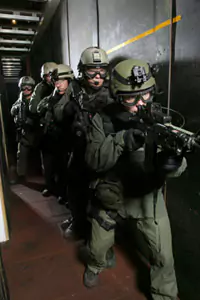Emergency Crime Units You Didn’t Know Existed

Perhaps due to their exclusivity or elusiveness, these crime units emerged as some of the most fascinating. While there are many units, the top 5 most interesting emergency crime units that you likely haven’t heard before are as follows:
- Critical National Asset Unit
- Digital Evidence Exploitation Unit
- Tactical Helicopter Unit
- Clandestine Technical Operations Unit
- Crime Scene Cleanup Crews
Critical National Asset Unit (CNAU)
The Critical National Asset Unit is an emergency crime unit a part of the Federal Bureau of Investigation. Critical national assets refer to a variety of different services and systems designed to support all pillars of society and government. These assets are considered essential to the economic, political, and social life of a nation.
After the September 11th terrorist attacks, the Critical National Asset Unit was created to protect national security technology and intellectual property classified as “critical national assets” by the government.
Just imagine that: you’re employed by the Critical National Asset Unit to protect the nation’s technology and intellectual property. Your day is spent catching the criminal activities of:
- Fraudsters
- Vandals
- Oil thieves
- Bandits
- Kidnappers
- Ethnic militias
- Violent conflicts involving the United States border, communes, and farmers/herders.
Violent farmer/herder conflicts… Bet you didn’t know that was a thing, huh? Well, sadly, it is. It’s not as prevalent as it is in Nigeria, but there have been case studies that the CNAU has had to investigate.
It’s definitely one of the more obscure emergency crime units—and rather elusive to the public. After all, this is one of the crime units that do not work directly with the public for investigation.
Digital Evidence Exploitation Unit (DEEU)
This branch of the FBI’s emergency crime unit is one of the many that focuses on the use of digital evidence and information found on things like a hard drive, mobile phone, or email. Perhaps one of the most interesting aspects of this emergency crime unit is that it also extends to apps as well.
These units emerged as a result of the digital age. It’s useful to note that digital evidence has helped the FBI solve some of the longest-running unsolved murder cases. One major one was the Kansas serial killer Dennis “BTK” Rader, who went unsuspected of killing 10 people for over 50 years. His location was finally traced after BTK left a hostile message on a floppy disk with the FBI.
As technology continues to unravel, this specific branch actively looks for methods that can be or are being exploited in electronic media (e.g. cell phones, laptops, IT).
Tactical Helicopter Unit (THU)
The Tactical Helicopter Unit is a part of the greater FBI Hostage Rescue Team (HRT). This is the branch you think of when doors are being kicked down, busted and hostages are being saved. Founded in the early 1980s, the HRT played a big role in Iraq and Afghanistan. The exact number of hostages saved by the HRT is not known, however, it is estimated that the HRT rescues at least 100 hostages a year.

A photo of the FBI Hostage Rescue Team agents.
Perhaps the most fascinating aspect of the Tactical Helicopter Unit, or THU, is its ability to dispatch a rescue helicopter within four hours of notification. The unit responds mostly to criminal emergencies involving national FBI assets, though it also responds to counterterrorism threats.
Since the September 11th threat on the Pentagon, it has also been tasked with the responsibility of evacuating key staff from Washington D.C. The THU also works closely with the FBI’s Rapid Deployment Logistics Unit, the unit focusing on investigating current issues, determining the cultural and geographical terrain, and guaranteeing equipment is arranged with minimal disruption to the environment and/or climate.
Clandestine Technical Operations Unit (CTOU)
Clandestine is often thought of in affiliation with clandestine labs, or underground drug lab operations. The word clandestine actually refers to secretive operations. So while clandestine can be used to describe a secretive drug lab, its use in the FBI actually refers to confidential emergency units.
The secretiveness of the Clandestine Technical Operations Unit (CTOU) may be the reason why it’s interesting. The CTOU works directly on a classified $300 million intelligence counterintelligence and counterespionage enterprise within the U.S.
The Foreign Intelligence Surveillance Act (FISA) established the CTOU as the primary planner and approval authority for court-approved monitoring and undercover joint surveillance operations. The emergency unit is also a liaison to the Foreign Intelligence Surveillance Court. The Foreign Intelligence Surveillance Court oversees surveillance warrants against suspected foreign spies inside the US.

A crime scene cleaner wiping down a biohazard car.
Crime Scene Cleanup Crews (CSC)
While not directly affiliated with the FBI, crime scene cleanup crews are one of the most underrated emergency crime units. Crime scene cleanup crews like the National Crime Scene Cleanup are independently owned and operated private companies that focus on biohazard cleanups.
You may be surprised to learn that law enforcement or detective units do not clean up the scene of a crime after an incident. Damages are left to the property owner, or most oftentimes the family. Thankfully, these situations are often covered by home or property insurance.
The National Crime Scene Cleanup (NCSC) is an emergency crime scene cleaning company with over 20 years of experience. If you are interested in reading more about what NCSC does, or perhaps in this situation yourself, please look over more detailed information about NCSC’s services.



